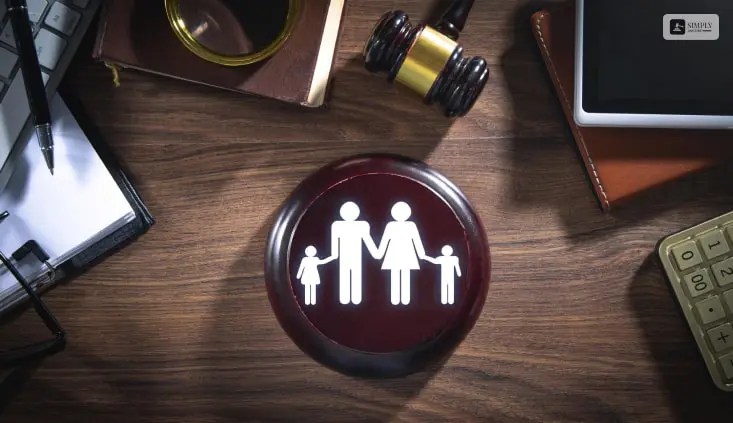
Are you or a loved one going through the difficult period of getting a divorce? Are you struggling with things like alimony and child custody battles? Well, we are here to help you.
Child custody battles can be challenging and tricky. There are Different Types Of Child Custody. Parents may disagree on whether to have joint custody or one parent to have sole custody. Each parent is required to prove why their particular custody arrangement is in the best interests of the child. Communication issues between parents can even prolong the custody battle. Gathering evidence to support one’s case can also become challenging.
- In 2021, there were 689,308 divorces in 45 U.S. states and 1,985,072 marriages.
- According to a U.S. Census Bureau report in 2020:
- In 1994, 16% of fathers had custody of their children.
- In 2014, it was 17.5%.
- In 2018, it increased to 20.1%.
- Additionally, statistics show that women win child custody rights 90% of the time.
In this article, we will be talking about Different Types Of Child Custody. Child custody in the USA refers to the legal and physical care of a child or children after a divorce or separation of the parents. When parents decide to end their marriage, one of the most crucial issues they must address is the well-being of their children. Custody determines where the child will live and who will make important decisions about their upbringing.
What Is A Child Custody Battle?

Child custody is about deciding who will take care of a child when parents separate or get divorced. It’s like figuring out where the child will live and who will make important choices for them, like where they go to school or get medical help.
Moreover, These are the things that are decided in the types of child custody that are settled on.
Sometimes, when parents decide to end their marriage, they can’t agree on what’s best for their child. This can lead to a child custody battle, where they go to court, hire a Barrhead Family Lawyer, and ask the judge to decide.
Moreover, Not all divorces end up in a custody battle, but it can happen if parents can’t find a solution together.
What Happens During A Child Custody Arrangement?

During a custody battle, both parents explain to the judge why they should have custody and why their plan is best for the child. They may have different ideas or feelings, which can make things complicated.
The judge’s main concern is the child’s well-being. They look at many things to decide what’s best, like the child’s age, their relationship with each parent, and how stable each home is.
Moreover, They also listen to what the child wants, especially if the child is older and can say what they prefer.
Sometimes, the judge may ask a professional, like a psychologist, to talk to everyone involved and observe how the child interacts with each parent.
Moreover, This person then gives their opinion to the judge, which helps them make a decision.
It’s essential for parents to think about what’s best for the child and work together if possible. Custody battles can be tough for everyone, so focusing on the child’s happiness and needs is vital.
What Different Types Of Child Custody?

Different types of child custody are essential because they consider what’s best for the child’s well-being in various family situations.
Moreover, Each type of custody serves a unique purpose and takes into account the child’s needs, the parents’ capabilities, and the overall family dynamics.
Joint Custody
In joint custody, both parents share the responsibility of taking care of the child. They make important decisions together, like where the child goes to school, what medical treatment they receive, and other crucial matters.
Moreover, The child spends time with both parents, and they usually divide their time equally between homes. Joint custody allows the child to have a strong relationship with both parents.
Sole Custody
With sole custody, only one parent has the legal authority to make major decisions for the child. They have the final say on important matters concerning the child’s life.
Moreover, The child may live primarily with the parent who has sole custody, while the other parent may have visitation rights. Sole custody is granted when the court believes it is in the best interest of the child due to specific circumstances.
Physical Custody
Physical custody determines where the child lives most of the time. In joint physical custody, the child spends significant time with both parents, typically dividing their time equally between homes.
Moreover, In sole physical custody, the child primarily lives with one parent, and the other parent usually has visitation rights.
Legal Custody
Legal custody involves the right to make important decisions for the child’s well-being. This includes decisions about education, healthcare, religion, and other significant aspects of the child’s life. In joint legal custody, both parents share the decision-making responsibility. In sole legal custody, only one parent has the authority to make these decisions.
Split Custody
In split custody, if there are multiple children involved, the children are divided between the parents. Each parent has physical custody of at least one child. Split custody is not very common because courts generally prefer to keep siblings together whenever possible.
Bird’s Nest Custody
In bird’s nest custody, the child remains in one home, while the parents take turns living with the child in that home. This means the child doesn’t move between homes, and the parents are the ones who rotate. Bird’s nest custody can provide stability for the child during a challenging time of divorce.
Third-Party Custody
Sometimes, a non-parent, like a grandparent or close relative, may seek custody of the child. This can happen if the court determines that it is in the best interest of the child to live with that person instead of either parent.
Temporary Custody
Temporary custody is granted during the divorce proceedings to ensure the child’s well-being until a final custody decision is made. Once the final decision is reached, the temporary custody arrangement may change or become permanent.
What Are The Federal Laws Regarding Different Types Of Child Custody?

Federal laws set up uniform child custody regulations throughout all states of the US. Let us look at some relevant federal laws.
Uniform Child Custody Jurisdiction and Enforcement Act (UCCJEA)
This law decides which state can make decisions about child custody when parents live in different states. It prevents parents from filing custody cases in multiple states to avoid confusion. Instead, it gives one state the authority to handle the custody matter, usually the state where the child lives most of the time.
Parental Kidnapping Prevention Act (PKPA)
The PKPA addresses custody issues when parents live in different states. It ensures that all states recognize and follow custody orders from the state where the custody decision was made. This helps maintain consistency and prevents “parental kidnapping.”
Indian Child Welfare Act (ICWA)
The ICWA protects the rights of Native American children and families in custody cases. It aims to keep Native American children connected to their culture and community by giving preference to Native American families when deciding custody.
Adoption and Safe Families Act (ASFA)
The ASFA focuses on child welfare and finding safe and permanent homes for children. It promotes timely decisions about a child’s future, encouraging adoption when it’s best for the child and ending parental rights if necessary for the child’s safety.
Child Abuse Prevention and Treatment Act (CAPTA)
CAPTA aims to prevent child abuse and neglect. It provides funding to support child protective services and programs that help families in crisis. The law emphasizes the importance of keeping children safe and well-cared for.
Violence Against Women Act (VAWA)
VAWA addresses domestic violence, sexual assault, and stalking. It can impact child custody cases if one parent has a history of violence. In such cases, custody decisions may be made to protect the child’s safety.
Family Violence Prevention and Services Act (FVPSA)
FVPSA provides funding for programs that support victims of domestic violence and their children. It focuses on creating safe environments for children and families.
Child Support Enforcement (CSE)
The Child Support Enforcement program ensures that non-custodial parents fulfill their financial responsibilities toward their children. It helps locate absent parents, establish paternity, and enforce child support orders to ensure the child’s financial well-being.
These federal laws are important as they protect children’s rights and ensure their well-being in custody cases.
Do You Need A Child Custody Attorney?

Contacting a child custody attorney can be essential in certain situations to protect the child’s well-being and ensure the best possible outcome. This is why you can contact a child custody attorney.
Divorce or Separation
When parents decide to divorce or separate, child custody becomes a crucial issue. A child custody attorney can help parents navigate the legal process and advocate for their rights as well as the child’s best interests.
Disagreements with the Other Parent
If parents can’t agree on custody arrangements, a child custody attorney can represent one parent’s interests and help negotiate a fair custody plan.
Child’s Safety Concerns
If one parent believes the child’s safety is at risk with the other parent.
Moreover, a child custody attorney can assist in presenting evidence and arguments to the court to protect the child.
Relocation
If one parent plans to move to a different city or state with the child, it can impact custody arrangements.
Moreover, A child custody attorney can help navigate the legal requirements for relocation.
Modification of Existing Custody Orders
When circumstances change significantly, such as a parent’s job relocation or remarriage.
Moreover, a child custody attorney can help modify existing custody orders to better suit the current situation.
Enforcement of Custody Orders
If one parent is not following the agreed-upon custody arrangements.
Moreover, a child custody attorney can help enforce the custody order and hold the non-compliant parent accountable.
Child’s Preferences
If the child is old enough to express their preferences about custody.
Moreover, a child custody attorney can help ensure their wishes are heard and considered by the court.
Parental Alienation
When one parent attempts to turn the child against the other parent, it can harm the child’s relationship with both parents.
Moreover, A child custody attorney can address parental alienation and protect the child’s bond with both parents.
Child Support Issues
Child custody and child support often go hand-in-hand. A child custody attorney can help parents understand their rights and responsibilities related to child support.
Complex Family Dynamics
In cases involving blended families or other complex family dynamics.
Moreover, a child custody attorney can navigate the legal complexities and advocate for the child’s best interests.
Domestic Violence Concerns
If there is a history of domestic violence or abuse, a child custody attorney can help protect the child from harm and seek appropriate restraining orders or supervised visitation.
Legal Knowledge and Experience
Child custody laws can be complex and vary from state to state.
Moreover, A child custody attorney has the expertise and experience to guide parents through the legal process and ensure they are well informed about their rights.
Mediation and Negotiation
A child custody attorney can assist parents in mediation and negotiation processes, aiming to reach agreements that benefit the child and avoid lengthy court battles.
Court Representation
If a child custody case goes to court, having a child custody attorney represent a parent can increase the chances of obtaining a favorable outcome.
Finally, What Different Types Of Child Custody Arrangement Is Best For You?

The type of child custody you should opt for depends on various factors, including your child’s age, your relationship with the other parent, and what’s best for your child’s overall well-being.
Moreover, When choosing the type of child custody, there are several important factors to consider. They are:
Child’s Age and Developmental Needs
Consider your child’s age and how they are developing.
Moreover, Younger children may need more stability and routine, while older children may want more say in the decision-making process.
Relationship with the Other Parent
Evaluate your relationship with the other parent.
Moreover, If you both communicate well and can cooperate for the child’s benefit, joint custody might be a good option.
Other factors may include:
- Living arrangements like how close you are to the other parent. If you live in different cities or states, joint physical custody might be challenging.
- See how each parent is in the child’s life and their ability to provide care.
- Moreover, if your child is old enough, talk to them about their preferences.
Hope you found the article helpful!
Read More:












